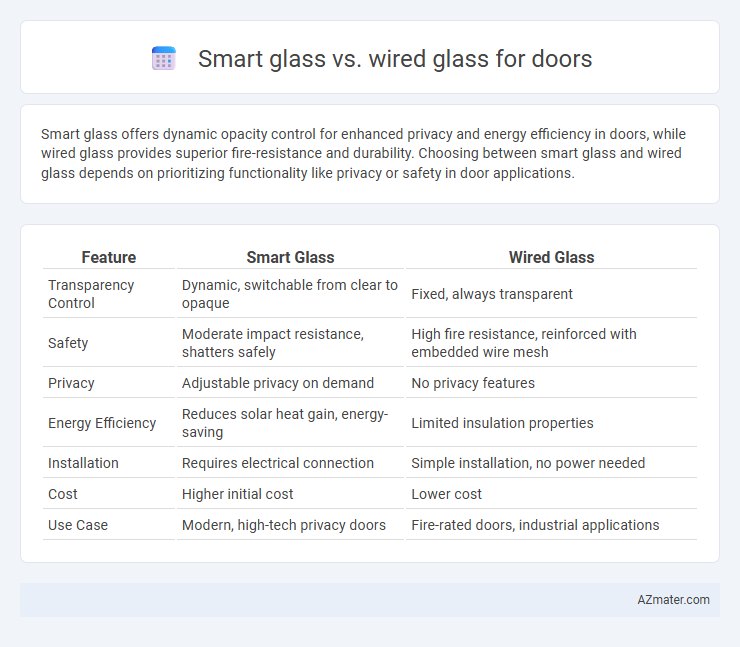Smart glass offers dynamic opacity control for enhanced privacy and energy efficiency in doors, while wired glass provides superior fire-resistance and durability. Choosing between smart glass and wired glass depends on prioritizing functionality like privacy or safety in door applications.
Table of Comparison
| Feature | Smart Glass | Wired Glass |
|---|---|---|
| Transparency Control | Dynamic, switchable from clear to opaque | Fixed, always transparent |
| Safety | Moderate impact resistance, shatters safely | High fire resistance, reinforced with embedded wire mesh |
| Privacy | Adjustable privacy on demand | No privacy features |
| Energy Efficiency | Reduces solar heat gain, energy-saving | Limited insulation properties |
| Installation | Requires electrical connection | Simple installation, no power needed |
| Cost | Higher initial cost | Lower cost |
| Use Case | Modern, high-tech privacy doors | Fire-rated doors, industrial applications |
Introduction to Smart Glass and Wired Glass for Doors
Smart glass for doors uses advanced technology to switch between transparent and opaque states, offering enhanced privacy and energy efficiency. Wired glass incorporates embedded metal mesh for safety and fire resistance, commonly used in commercial and industrial doors. Each material serves specific purposes, with smart glass prioritizing modern functionality and wired glass focusing on durability and safety.
Key Differences Between Smart Glass and Wired Glass
Smart glass uses electrochromic technology to switch between transparent and opaque states, offering dynamic privacy and energy efficiency, while wired glass incorporates a metal mesh for enhanced fire resistance and structural strength. Smart glass is primarily designed for light control and aesthetic purposes, whereas wired glass prioritizes safety and fire protection in building applications. The installation and maintenance of smart glass often involve electronic components, contrasting with the simpler, more durable wired glass panels.
Security Features: Smart Glass vs Wired Glass
Smart glass for doors offers dynamic opacity control, enhancing privacy and security by limiting visibility on demand, while wired glass provides inherent fire resistance due to embedded wire mesh that holds the glass intact during breakage. Smart glass incorporates advanced technology, such as electrochromic or polymer dispersed liquid crystal layers, allowing rapid transition between transparent and opaque states, deterring potential intruders. Wired glass, with its robust structural integrity, resists shattering under impact and maintains a barrier against forced entry, though it lacks the adaptive security features found in smart glass.
Privacy Control: Advantages of Smart Glass Over Wired Glass
Smart glass offers superior privacy control compared to wired glass by enabling instant transition from transparent to opaque states through electronic activation, providing on-demand visual privacy without compromising natural light. Unlike wired glass, which relies on embedded metal wires for safety but remains permanently translucent or frosted, smart glass allows dynamic adjustment of privacy levels, ideal for modern door applications. This digital control enhances user convenience and energy efficiency by reducing the need for additional window coverings or replacement.
Energy Efficiency: Comparing Smart Glass and Wired Glass
Smart glass offers superior energy efficiency for doors by dynamically controlling solar heat gain and reducing the need for artificial cooling, while wired glass provides basic thermal insulation but lacks adaptive capabilities. Smart glass technologies, such as electrochromic and thermochromic, enable automatic tint adjustment to optimize daylight and minimize energy consumption. Wired glass, primarily designed for safety and fire resistance, does not significantly contribute to energy savings compared to the advanced energy management features of smart glass.
Design and Aesthetic Options for Door Applications
Smart glass offers dynamic opacity control, allowing doors to switch between transparent and opaque states for customizable privacy and modern aesthetics. Wired glass provides a traditional yet robust design, featuring embedded wire mesh that enhances security while maintaining a classic industrial look. Both options cater to distinct design preferences, with smart glass delivering sleek minimalism and wired glass offering vintage charm and strength.
Durability and Maintenance Considerations
Smart glass for doors offers enhanced durability with impact-resistant layers and scratch-resistant coatings, reducing the likelihood of damage over time. Wired glass, reinforced with embedded wire mesh, provides superior fire resistance but is more prone to chipping and requires regular inspections to ensure wire integrity. Maintenance for smart glass typically involves minimal cleaning with non-abrasive materials, while wired glass demands vigilant upkeep to prevent corrosion of the embedded mesh and maintain safety standards.
Cost Analysis: Initial Investment and Long-Term Value
Smart glass doors typically demand a higher initial investment ranging from $100 to $250 per square foot due to advanced technology and installation complexity, while wired glass options cost approximately $50 to $100 per square foot, offering a more budget-friendly entry. Long-term value of smart glass includes energy efficiency and privacy control that can reduce utility bills and enhance property appeal, justifying the upfront cost over time. Wired glass provides durability and fire-resistant benefits at a lower price point, but lacks the multifunctional advantages of smart glass, impacting its potential for future return on investment.
Installation Process and Compatibility with Existing Doors
Smart glass installation typically requires specialized wiring and integration with the building's electrical system, making it more complex compared to wired glass, which can often be installed using standard glazing techniques. Wired glass is generally compatible with most existing door frames without extensive modification, whereas smart glass may need custom framing or additional space for electronic components. Choosing between the two depends on the door's structure and the ease of incorporating electrical connections for smart glass functionality.
Choosing the Best Option: Smart Glass or Wired Glass for Your Door
Choosing between smart glass and wired glass for your door depends on your priorities in security, privacy, and functionality. Smart glass offers advanced control over transparency and privacy with its electrochromic technology, making it ideal for modern, energy-efficient spaces. Wired glass, embedded with metal mesh, provides superior fire-resistant strength and security, suitable for areas needing enhanced durability and safety compliance.

Infographic: Smart glass vs Wired glass for Door
 azmater.com
azmater.com